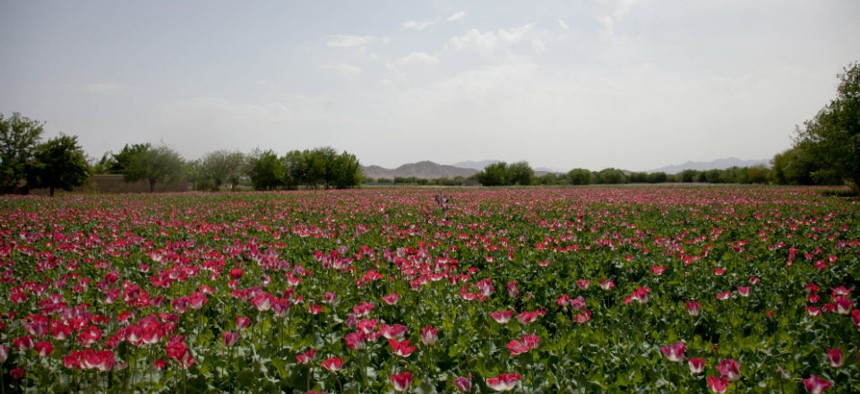
Defense Department file photo
$7 Billion Bid to Wean Afghanistan From Opium Trade Is a Bust
Special inspector general reports poppy farming levels are at an all-time high.
Among the long-term goals of the U.S-led coalition in Afghanistan was helping the war-torn underdeveloped country kick its economic dependency on the cultivation of poppies for the world’s illegal opium markets. But after various agencies spent $7.6 billion over more than a decade on counternarcotics efforts, opium poppy cultivation levels in Afghanistan hit an all-time high in 2013, according to a report released Tuesday by the Special Inspector General for Afghanistan Reconstruction.
“As you know, the narcotics trade poisons the Afghan financial sector and undermines the Afghan state’s legitimacy by stoking corruption, sustaining criminal networks, and providing significant financial support to the Taliban and other insurgent groups,” IG John Sopko wrote on Oct. 14 to Secretary of State John Kerry, Defense Secretary Chuck Hagel, Attorney General Eric Holder and U.S. Agency for International Development Administrator Rajiv Shah.
According to the United Nations Office on Drugs and Crime, “Afghan farmers grew an unprecedented 209,000 hectares of opium poppy in 2013, surpassing the previous peak of 193,000 hectares in 2007,” the IG said. “With deteriorating security in many parts of rural Afghanistan and low levels of eradication of poppy fields, further increases in cultivation are likely in 2014.”
The report, which includes detailed maps and charts of trends, noted that while affordable deep-well technology has turned 200,000 hectares of desert in southwestern Afghanistan into arable land over the past decade, “Due to relatively high opium prices and the rise of an inexpensive, skilled, and mobile labor force, much of this newly-arable land is dedicated to opium cultivation. Poppy-growing provinces that were once declared 'poppy free' have seen a resurgence in cultivation.”
On reviewing a draft of the report, agency officials acknowledged the grim news, though the U.S. Embassy in Kabul, responding for State and USAID, wrote that efforts to build the Afghan government’s counternarcotics capabilities are still in progress. But the embassy also pointed to results, highlighting the success of specialized Afghan interdiction units and a network of drug treatment programs in Afghanistan. “There is no silver bullet to eliminate drug cultivation or production in Afghanistan or to address the epidemic of substance abuse disorder that plagues too many Afghans,” the embassy said. “We look forward to the new Afghan government assuming a leadership role in this regard.”
The Defense Department, which is supervising the exit of most U.S. troops from a country that still faces attacks by Taliban, said it had other issues to focus on. Assistant Defense Secretary Michael Lumpkin replied to the IG noting that eradication of poppy cultivation is the responsibility of the Afghan government. “The report supplies no new information related to our department,” he wrote, “so we respectfully request that you remove Defense Secretary Hagel as an addressee.”







